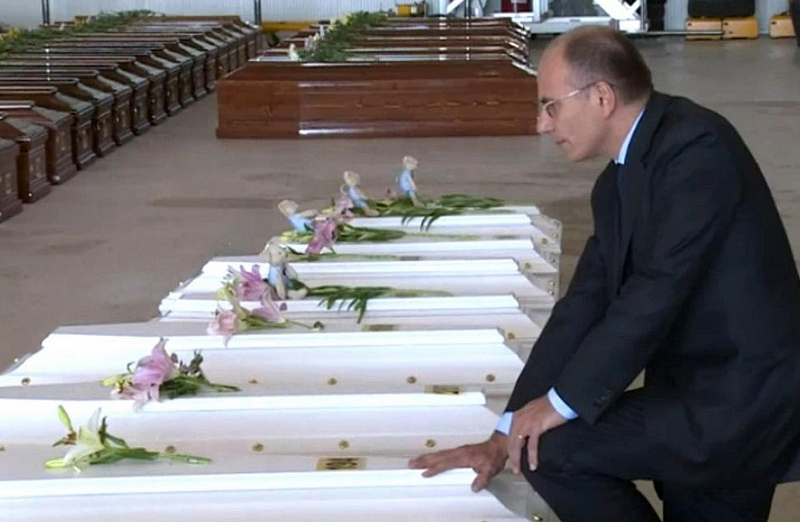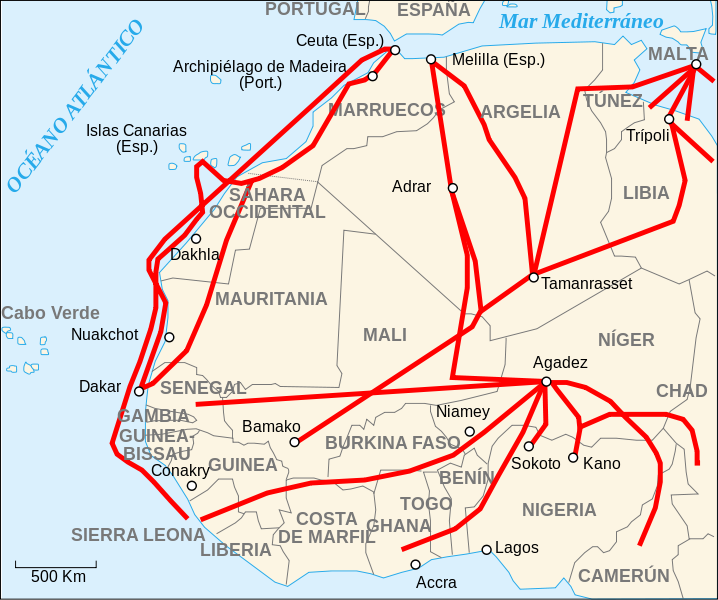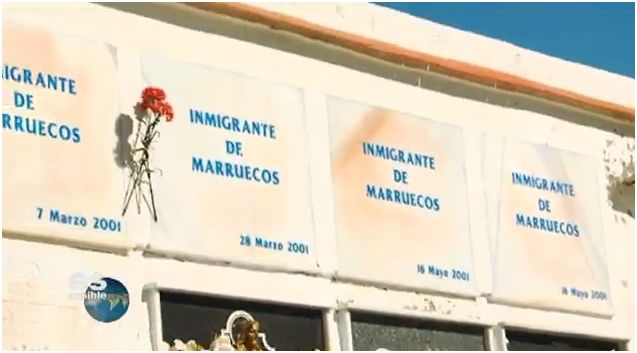
Italian Prime Minister, Enrico Letta, visits the site of the coffins before the funeral. Photo Palazzo Chigi used under CC License BY-NC-SA 2.0.
A boat carrying almost 500 immigrants, many of them women and children, caught fire and sunk [es] off the coast of Lampedusa on October 3, leaving at least 363 dead.
Lampedusa is a small Italian island located between Sicily and the north of Africa, a little more than 100 km from Tunisia. Due to its proximity to the African coast, the island is one of the entry points used by refugees and undocumented migrants to reach the European Union. Citizens of Sudan, Somalia, Eritrea or Syria fall into the hands of mafias dealing in human trafficking, who use old fishing boats to carry them to the European coast.
These dangerous journeys, in old and overburdened boats, increase at the end of the summer in anticipation of the winter “break” during which such crossings are suspended due to poor sailing conditions.
Many of the survivors of this shipwreck are alive thanks to the help of fishermen who were in the area, although various witnesses state that at least three boats passed close to the site of the tragedy without stopping to help the victims [es].
This behaviour is due to the fear inspired in fishermen by the strict Bossi-Fini law against illegal immigration, supported by the far right and passed in 2002 during Berlusconi's mandate, which criminalises immigrants with an irregular status and those who assist them in any way.
According to the blog Kaos en la Red [es],
El otro horror de la ley Bossi-Fini reside en la condena por complicidad con el delito de clandestinidad a las personas que ayuden a un supuesto clandestino a poner el pie en “la tierra de Italia”. Así, los pescadores de Lampedusa que ayuden a una persona que esté ahogándose pueden ver su barco, su instrumento de trabajo, confiscado y ser condenados. Lo cual va completamente en contra de la Convención de las Naciones Unidas sobre los refugiados y del derecho internacional de navegación. Así, Giorgio Bisagna, experto en derecho a la inmigración, abogado en Palermo, afirma: “En el caso del naufragio de Lampedusa, el delito podría haber sido cometido por quienes no han intervenido para auxiliar a refugiados que se encuentran en la mar”.
The other horror of the Bossi-Fini law lies in the conviction on the basis of collusion with the crime of clandestinity of those persons who assist a presumed clandestine migrant to set foot on “Italian soil.” In this way, those fishermen in Lampedusa who assist a person who is drowning can see their boat, their working material, confiscated and may be sentenced to prison. This goes completely against both the United Nations Convention on Refugees and international maritime law. Thus, Giorgio Bisagna, expert in immigration law and a lawyer in Palermo, states: “In the case of the Lampedusa shipwreck, the crime could have been committed by those who did not intervene to assist the refugees who were in the sea”.

Map of African immigration routes to Europe. Image from Wikimedia Commons uploaded by the user historicair. With licence CC BY-SA 3.0
The case of Spain
Spain is another of the entry points to Europe used by African immigrants. The Strait of Gibraltar, just 14 km wide, is one of the routes preferred by mafias to move immigrants in pateras [es], small boats or inflatable dinghies which are too fragile to cross these dangerous waters. Shipwrecks are common and immigrants must often be rescued by fishermen and coastguards in the area.
But this could soon change, as the website cuartopoder.es [es] reports:
Según la reforma del Código Penal que el ministro de Justicia, Alberto Ruiz Gallardón, tiene en cartera quienes faciliten la entrada, acojan, ayuden o alojen a inmigrantes indocumentados incurrirán en delito punible y podrán ser castigados con dos años de cárcel. Algunos colectivos de ayuda a los inmigrantes se movilizaron en abril pasado y han recogido más de 100.000 firmas con la campaña “salvemos la hospitalidad”.
According to the reform of the Penal Code which the Justice minister, Alberto Ruiz Gallardón, is planning, those who facilitate the entry of undocumented migrants, and shelter, assist or lodge them, will commit a punishable crime and will be able to be punished with two years of prison. Some collectives assisting migrants mobilised in April and have collected more than 100,000 signatures with the “let's save hospitality” campaign [es].
Lack of will from European authorities
Besides the Strait of Gibraltar, other important entry routes to Spain for immigrants are the Canary Islands and the Spanish enclaves of Ceuta and Melilla on the north coast of Africa.
European Union (EU) policy leaves the rescue of undocumented immigrants in the hands of the member states in whose waters they are shipwrecked, and does not allocate special financial assistance to those most affected by this problem. The Mediterranean countries, which are suffering more severely from the economic crisis than those in the north, have been asking Europe for help for years without obtaining any response.
The rise of far-right parties with a pronounced xenophobic ideology which support the strengthening of fortress Europe against illegal immigration, is causing European governments to adopt a tougher position on the issue in an attempt to counteract the populist discourse of the far right.
On October 8th, 28 European interior ministers met in Luxembourg with the intention of tackling the issue of the rescue of immigrants on the EU's Mediterranean coast. Once again, the meeting was a disaster, as El País [es] describes:
Toda la reprobación y la vergüenza que han expresado los políticos europeos tras la tragedia de Lampedusa han quedado, de momento, en una mera declaración de intenciones. La Unión Europea se mostró ayer incapaz de concretar un proyecto para rescatar a inmigrantes que naufraguen en las costas del Mediterráneo. La Comisión Europea trasladó su propuesta a los Estados miembros, pero ninguno fue capaz de ofrecer ni calendarios concretos ni dotación económica para intentar paliar el drama de quienes se lanzan al mar para llegar a Europa.
All of the condemnation and shame expressed by European politicians following the Lampedusa tragedy [es] has been, for the moment, no more than a mere declaration of intentions. The European Union demonstrated yesterday that it is incapable of settling upon a project to rescue immigrants who are shipwrecked on the Mediterranean coast. The European Commission transferred its proposal to member States, but none was able to offer a concrete timeframe or economic resources to try to alleviate the suffering of those who set out to sea to reach Europe.
Nacho Torreblanca sums it up in the following way on Twitter:
Lampedusa no es una tragedia. Es la consecuencia de unas serie de decisiones políticas deliberadas http://t.co/YJGRe13257
— Nacho Torreblanca (@jitorreblanca) October 11, 2013
Lampedusa is not a tragedy. It is the consequence of a series of deliberate political decisions http://t.co/YJGRe13257
— Nacho Torreblanca (@jitorreblanca) October 11, 2013

Tombs of unidentified immigrants in Tarifa's cemetery (Spain). Screen capture from a video by canalsuresposible on YouTube
Manuel Zaguirre says on the website Rebanadas de realidad [Slices of Reality] [es]:
El Papa Francisco, cuyas declaraciones, decisiones, tomas de postura y testimonio de vida me merecen cada vez más interés, visitó en el mes de Julio la isla de Lampedusa. Pudimos conocer entonces que tiene apenas 5000 habitantes y que han sido casi el doble los inmigrantes que han muerto a orilla de su “mare nostrum” en los últimos 15 ó 20 años. Conocimos, también, de la solidaridad de sus habitantes y de la combatividad de sus autoridades locales, con la Alcaldesa al frente, denunciando la falta de apoyos e interés ante el desborde y la tragedia de los inmigrantes.
Pope Francisco, whose declarations, decisions, stances and life's testimony deserve more and more of my interest, visited the island of Lampedusa in July. We were thus able to learn that the island has just 5000 inhabitants and that the number of immigrants who have died on the shores of its “mare nostrum” in the last 15 or 20 years is almost double this figure. We also discovered the solidarity of the island's inhabitants and the fighting spirit of its local authorities, with the Mayoress at the helm, condemning the lack of support and interest in the face of the overflow and tragedy of the immigrants.







6 comments
I don’t see why the affected nations blame the EU and ask it for help instead of taking responsibility.
A UE acções de combate as redes clandestinas dentro da Europa e dos paises em desenvolvimento e erradicar os abusos dos direitos humanos
yes blame the right wing for enforcing the nations imigration laws.